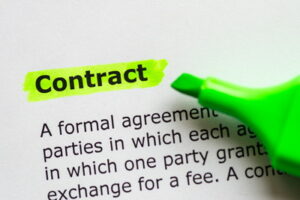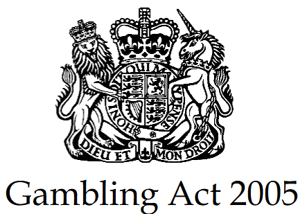 When it comes to placing bets at an online casino, sportsbook or any other gambling site, it’s usually the case that we, as players, are solely out to place wagers and we give little thought to the legalities behind them.
When it comes to placing bets at an online casino, sportsbook or any other gambling site, it’s usually the case that we, as players, are solely out to place wagers and we give little thought to the legalities behind them.
We see a game that we want to play or a sports event that we want to bet on, and we usually go ahead and place it. Not many of us have really considered how this bet actually works “behind the scenes”, so to speak. We very rarely go beyond the thought process of, “I’m going to place a bet on this upcoming football match because I hope to win”. Most people will only think beyond this when something goes wrong.
However, what exactly is a bet when you place it and is it upheld in law? Essentially, we want to look into whether or not a gambling contract is something that can be enforced by the law, if needs be. Are gambling contracts legally enforceable?
We’ll look closer at what exactly makes a bet a contract and how they are actually enforceable. Plus, we have some information on how people are able to make complaints and potentially take companies to court over these contracts if necessary.
Is A Bet Actually A Contract?
 If you were to visit an online gambling company that holds a licence from the United Kingdom Gambling Commission (UKGC), and proceed with placing a bet there, this would enter you into a contract. That is completely and fully legally enforceable, and it acts as a contract between you as the player and the casino, sportsbook, poker room, etc.
If you were to visit an online gambling company that holds a licence from the United Kingdom Gambling Commission (UKGC), and proceed with placing a bet there, this would enter you into a contract. That is completely and fully legally enforceable, and it acts as a contract between you as the player and the casino, sportsbook, poker room, etc.
The terms and conditions of this bet that you place must be clearly visible and readily available to you before you proceed with it. You need to be familiar with those terms prior to submitting your wager as well, so that you know precisely the circumstances that you are betting on. The terms that govern your contract are specific to the gambling site in question, i.e. terms with one bookmaker or casino will not necessarily be the same with another – although, within that, terms have to be clear and fair so there is a lot of commonality. This is especially true if it should come to the point where the circumstances surrounding a bet change that can lead to bets be voided, payouts reduced or even refused.
The UKGC states in its official wording that it requires a gambling businesses in the UK to “provide a means for you to complain about the bet”, which is something that ensures it can keep the industry fair. In order to complain, though, you must be sure that the betting company has either not met their own T&C’s or that those T&C’s are unfair, unclear or misleading. You need to complain to the gambling company first, if you cannot resolve things this way you can escalate a complaint to an independent body such as IBAS who can settle complaints up to £10,000, and if all else fails, and you believe you are right, you can take a company to court – although, this costs a lot of money and is rarely done.
Your bet can also be refused by a gambling business. These companies are private businesses and therefore, like most businesses, they can pick and choose their customers (rightly or wrongly). Just as you take the decision to place a wager on a game or sporting event, the casino or sportsbook can pick and choose who they accept bets from. They can also decide upon their own terms that govern the bets they accept. The likelihood is that they will accept 99.9% of all bets placed, because casinos and other associated gambling companies like making money. The whole basis of their business centres on it.
Due to the fact that a bet needs to be a commercial arrangement between two parties who are both willing to enter into the contract, there is nothing in place that dictates that the gambling business must accept your bet. This is exactly the same as any other business operating in the UK. As with commercial businesses, offers may be withdrawn whenever the company feels like it. And so too, gambling businesses may withdraw offers or refuse bets as a way of reducing the risk to their own business.
The fact you are entering into a contract is also the reason why you can’t sell your bets, bet on behalf of someone else, bet with someone else’s money or use insider information or knowledge attained by ill gotten means to place a bet. If you are suspected of committing fraud or using criminal money you will contravene the terms of your contract, which may lead to a betting company refusing to pay you out (and even keeping hold of your stakes and deposits following investigation). If you are also paid out accidentally or paid out more than you should be this is why gambling companies can force you to pay back that money. All elements of the contract are dictated by the T&C’s at the company – some of which are there discretion and some of which they are obliged to enforce by law (such as you needing to prove you are over 18 and where you live).
Your Rights When Entering Into A Gambling Contract
 Just as the casino or sportsbook that you are placing a bet with has its own rights, so too do you as a player. The contract works both ways, so you have the chance to make a complaint with regard to an unscrupulous betting contract, if you believe you have suffered at the hands of one. The contract can be enforced by law, and in this respect, you can take it to court if you think it has not met the stated terms and conditions when you entered into it.
Just as the casino or sportsbook that you are placing a bet with has its own rights, so too do you as a player. The contract works both ways, so you have the chance to make a complaint with regard to an unscrupulous betting contract, if you believe you have suffered at the hands of one. The contract can be enforced by law, and in this respect, you can take it to court if you think it has not met the stated terms and conditions when you entered into it.
In order to proceed with this, all gambling businesses holding a licence from the Gambling Commission must also have a complaints procedure in place. This should be there so that you have the ability to make a complaint about a disagreement you may have. You may believe you should have won a bet that was marked as a loss, you may disagree with the amount of money you received as a result of winning, the way your payments were managed by the company, the bonus offers or anything else.
It is always the case that you should complain directly to the gambling business itself first off. In most cases, disagreements can be resolved this way. However, if you still aren’t happy with the outcome, you can escalate that further, because all gambling businesses should also provide their players with access to an alternative dispute resolution (ADR). This should be offered freely for the consumer to take advantage of, and this route should be taken before you make any decision on whether or not to take the contract and anything associated with it to court.
An ADR operates independently of the gambling business, and therefore has no bias towards either side. Your complaint will be looked at again through this ADR, which has to be chosen from a UKGC-approved list of providers by the gambling business. That ADR provider must be listed in the business’s complaints procedure for you, the player, to take notice of when trying to resolve a complaint.
Betfred Comes Up Short in £1.7 Million Jackpot Payout

One example of a player suing a gambling business and winning thanks to the enforcement of his betting contract occurred only recently. In 2018, Andrew Green chose to play blackjack online at the Betfred platform. During his round of gameplay on the Magic Seven table game, which he participated in via his mobile device, Mr Green hit a huge £1.7 million jackpot. Right after winning it, he was congratulated by an employee of Betfred for his victory.
However, just five days later, Mr Green was informed by the operator that he would not be receiving his £1.7 million jackpot reward. Why? Because Betfred said that the platform had experienced a software glitch at the time of his winning hand. This, it said, meant that the game had not been able to reset itself. Rather than pay out his winnings, Betfred offered the player a reward of £60,000, which it considered to be a “goodwill gesture”, rather than pursuing his £1.7 million jackpot payout.
Mr Green rejected that deal and proceeded forward with legal action against the gambling business so he could claim all of his winnings. That lawsuit went on for three years, with a result only coming at the beginning of April 2021. The High Court judge Mrs Justice Foster ruled in Mr Green’s favour, stating that Betfred had no grounds for withholding the jackpot win from him. That ruling meant that the player would receive all of his £1.7 million payout, plus additional interest on top, equating to a total of almost £2 million. Betfred apologised for its delay in paying out the sum to Mr Green, stating that it will not appeal the ruling.
After the final ruling, Mr Green spoke up, encouraging other players who have been mistreated by gambling companies to challenge them in court. He said that his was outright proof that justice is not something that is impossible to get – even against a large company like Betfred.
It Hasn’t Always Been the Case
 Gambling may be an activity that has been around for many centuries already, but it hasn’t always been the case that betting contracts have been legally enforceable. In fact, up until the introduction of the Gambling Act 2005, players weren’t covered legally at all. Along with this act, gambling debts became legally enforceable, helping to ensure that those players who won actually got their rightful money from a betting company in the UK.
Gambling may be an activity that has been around for many centuries already, but it hasn’t always been the case that betting contracts have been legally enforceable. In fact, up until the introduction of the Gambling Act 2005, players weren’t covered legally at all. Along with this act, gambling debts became legally enforceable, helping to ensure that those players who won actually got their rightful money from a betting company in the UK.
This law was introduced alongside others, such as the setting up of the Gambling Commission to govern the industry, the possibility for local people to object to new gambling licences, and the necessity for operators to prominently display information about responsible gambling.
However, it was only very recently that gambling laws in Northern Ireland were altered so as to cater to this particular area as well. Towards the end of May 2021, reports of the first significant changes to those laws in 35 years were announced. The legislation will allow bookmakers to open on Sundays and on Good Friday, while it will become an official offence to allow minors to access gaming machines.
At the same time as those new pieces of legislation though, Northern Ireland will also make gambling contracts enforceable by law – something which the country has not had in effect ever before. Commenting on the introduction of change in Northern Ireland, Communities Minister Deirdre Hargey said that the country’s legislation was “old and complex”, and that it had not kept up the pace with modern day changes and emerging technologies.
The Power of the Gambling Commission
 The Gambling Commission may have only been set up as part of the Gambling Act 2005, but it has obtained plenty of power over those years of activity. For example, the Commission can void a bet, if it decides that the wager placed was “substantially unfair”. In this instance, the player’s wager should be returned to them by the gambling business, and if it isn’t, then they can legally make a claim for it.
The Gambling Commission may have only been set up as part of the Gambling Act 2005, but it has obtained plenty of power over those years of activity. For example, the Commission can void a bet, if it decides that the wager placed was “substantially unfair”. In this instance, the player’s wager should be returned to them by the gambling business, and if it isn’t, then they can legally make a claim for it.
The factors which are considered when deciding upon whether the bet was actually unfair include if either party was supplied false or misleading information and if either party believed that the game or other process related to the bet would be conducted in contravention of industry rules.
Each different country has its own gambling regulatory body or laws, and it is up to these bodies to set up the necessary rules around gambling. This will determine whether gambling contracts are legally enforceable by law within the jurisdiction they cover.
In the United States of America, for example, contracts relating to legal gambling activities only become enforceable where it is considered legal. Because casino gambling online in many US locations is considered an illegal activity, the contracts that players place at offshore sites cannot be considered legally enforceable. Therefore, should a player partake in offshore casino gambling, they risk not being able to legally complain or sue the operator for failed payouts etc.
On that note, even if you bet within a legal market, like the UK, you are only protected in law if you bet with a licensed betting company. If you bet with an unlicensed gambling site and they decide not to pay you out or simply steal your money there is little you can do. The onus is also on you as the bettor to ensure the site you are betting with is licensed.
It is always important to check into where the online casino, sportsbook, poker room, bingo site, etc., that you are joining, is licensed. Read through the terms and conditions associated with its licence and find out if you are indeed covered legally for your betting contracts. You need to know that you have a course of action that you can take should the circumstances surrounding a wager change.